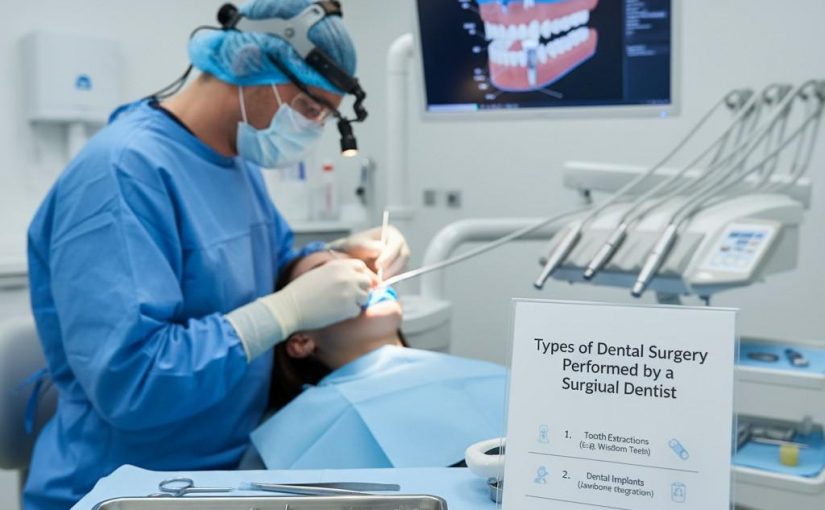When most people think of the dentist, they picture routine cleanings or fillings—but some dental concerns require more advanced care. That’s where a surgical dentist comes in. Surgical dentists, also known as oral surgeons or dental surgeons, specialize in complex procedures that go beyond general dentistry, often involving the teeth, gums, jawbone, and facial structures.
At Metro City Dentistry, our experienced surgical dental team offers a full range of dental surgeries to restore health, function, and confidence in your smile. In this blog, we’ll explore the most common types of dental surgeries performed by surgical dentists—so you can better understand your options and what to expect if you need one.
-
Tooth Extractions (Including Wisdom Teeth Removal)
One of the most common procedures performed by a surgical dentist is tooth extraction. While some extractions are simple, others—like impacted or infected teeth—require surgical precision.
Reasons for surgical tooth extractions:
- Impacted wisdom teeth
- Severely decayed or broken teeth
- Overcrowding before orthodontic treatment
- Infected or abscessed teeth
- Teeth that have fractured below the gumline
In surgical extractions, the dentist may need to make a small incision in the gum or even remove bone to safely extract the tooth.
-
Dental Implants
If you’re missing one or more teeth, dental implants are one of the most effective and long-lasting solutions available. The process involves a surgical placement of a titanium post into the jawbone, which acts as a replacement root for a prosthetic tooth.
Key steps in dental implant surgery:
- Placement of the implant into the jawbone
- Healing period for the bone to fuse with the implant (osseointegration)
- Attachment of an abutment and crown to complete the tooth
Implants are ideal for restoring both aesthetics and function and can last decades with proper care.
-
Bone Grafting
Before placing a dental implant, some patients require a bone graft to strengthen the jawbone. This procedure involves adding bone material (from the patient or a donor) to areas with insufficient bone density.
Why bone grafting may be needed:
- Bone loss due to tooth extraction or gum disease
- Jawbone deterioration over time
- Preparation for implant placement
Bone grafting ensures a solid foundation for future dental restorations and helps maintain facial structure.
-
Gum Surgery (Periodontal Surgery)
When gum disease progresses beyond the early stages, surgical intervention may be necessary. A surgical dentist can perform periodontal surgery to treat advanced periodontitis and preserve your natural teeth.
Types of gum surgery include:
- Flap surgery: lifting the gums to remove tartar deep below the gumline
- Gum grafts: covering exposed roots due to gum recession
- Regenerative procedures: encouraging new bone or tissue growth
Gum surgeries are essential for controlling infection, preventing tooth loss, and improving oral health.
-
Apicoectomy (Root-End Surgery)
If a root canal has failed or an infection persists at the tip of a tooth’s root, a surgical dentist may perform an apicoectomy.
What it involves:
- Opening the gum tissue near the tooth
- Removing the infected root tip and surrounding tissue
- Sealing the end of the root
This microsurgical procedure can often save a tooth that would otherwise need to be extracted.
-
Cyst or Tumor Removal
Sometimes, cysts, benign growths, or tumors can form in the jawbone or soft tissues of the mouth. A surgical dentist is trained to diagnose and remove these lesions safely, often with a biopsy to determine whether further treatment is needed.
Common oral pathology procedures include:
- Removal of oral cysts or tumors
- Biopsies of suspicious lesions
- Treatment of abscesses and infections
Early detection and surgical removal of abnormal tissue is vital for oral and overall health.
-
Corrective Jaw Surgery (Orthognathic Surgery)
For patients with jaw misalignment, severe bite problems, or breathing issues such as sleep apnea, corrective jaw surgery may be recommended. This involves repositioning the upper and/or lower jaw to improve function and facial symmetry.
Benefits of jaw surgery:
- Correcting bite alignment
- Improving speech and chewing
- Relieving pain caused by TMJ disorders
- Enhancing facial appearance
This type of surgery is often done in coordination with orthodontic treatment.
When Should You See a Surgical Dentist?
You may need to see a surgical dentist if:
- You’ve been referred after an unsuccessful root canal
- You have impacted or problematic wisdom teeth
- You’re missing teeth and considering implants
- You’ve experienced facial trauma or injury
- You have ongoing oral infections or cysts
At Metro City Dentistry, we provide in-house consultations and surgical care to make the process smooth, safe, and comfortable.
Trust Your Smile to Metro City Dentistry
Dental surgery doesn’t have to be intimidating. With the right care, modern techniques, and a compassionate team, it can be a positive step toward better oral health and a more confident smile.
Our skilled surgical dentists at Metro City Dentistry are here to answer your questions, explain your options, and provide expert care every step of the way.
Ready to learn more or schedule a consultation?
📞 Call Metro City Dentistry today to speak with our friendly team and find out if surgical dentistry is the right step for your smile.





